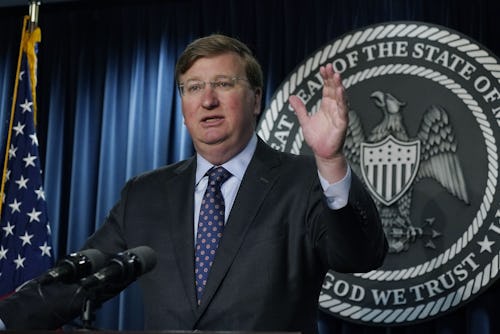Mississippi’s capital is officially out of safe water
In Jackson, officials are warning there is no “water to fight fires, to flush toilets, and to meet other critical needs.”

Yet another majority Black city in the United States is experiencing a water crisis. And no, it’s not Flint (although the crisis there still isn’t over). Instead, the U.S.’s latest public health disaster is unraveling in Jackson, Mississippi. As Jackson’s water system fails, nearly 150,000 people are now left without access to safe, clean drinking water.
On Monday night, Mississippi Gov. Tate Reeves (R) held an emergency briefing to declare that Jackson’s water system had failed. There, Reeves urged residents to “stay safe” and cautioned, “Do not drink the water. In too many cases, it is raw water from the reservoir being pushed through the pipes.”
As a city, Jackson is no stranger to water issues. For the past month, it has been placed under a boil advisory. But at Monday night’s briefing, Reeves noted, “This is a very different situation from a boil water notice.” He added that as of now, Jackson doesn’t have “reliable running water at scale.”
Jackson’s current problem stems from operational collapse at O.B. Curtis, one of two water treatment facilities in Jackson, which is meant to provide 50 million gallons daily. Recently, though, the main pumps at O.B. Curtis were damaged, leaving the facility to run on backup pumps. CNN reported that Reeves said he was told Friday that “it was a near certainty that Jackson would fail to produce running water sometime in the next several weeks or months if something did not materially improve.”
“The city cannot produce enough water to fight fires, to flush toilets, and to meet other critical needs,” Reeves said at the emergency briefing. “The Mississippi Emergency Management Agency will take the state’s lead on distributing drinking water and non-drinking water to residents of the city of Jackson.”
Jackson has struggled with a deteriorating water system for years. Per CNN, a winter storm shut down Jackson’s entire water system in February 2021, leaving tens of thousands of residents without any water. Although the exact cause of failures at O.B. Curtis are unknown, city officials are pointing to recent flooding as a potential factor.
Over the weekend, the Pearl River, which flows through Jackson, crested due to record-setting rain. Although just below the major flood stage, USA Today reported that city officials estimated between 100 and 150 homes could be impacted by floodwaters. On Monday, Jackson Mayor Chokwe Antar Lumumba (D) also declared a water system emergency, citing the “threat of excessive rainfall and extreme flooding.”
During a news conference, Lumumba told reporters, “It is no secret to any of us that we have a very fragile water treatment facility.” In fact, it’s such a non-secret that Lumumba and Reeves have had a bit of a back-and-forth regarding Jackson’s water. Earlier this month, Lumumba objected to Mississippi’s latest boil advisory, stating, “I continue to say to you, time and time again, that we are always in a state of emergency.” He noted the city needs more financial assistance to address underlying issues. In response, Reeves slammed Jackson’s infrastructure spending.
Mic reached out to the offices of both Reeves and Lumumba for comment on the water crisis but did not receive an immediate response. But amidst all the political back-and-forth, Jackson residents — the city is 82% Black — are the ones left to suffer. There’s the obvious issue of not having access to safe water. With the current emergency, though, public schools in Jackson have also gone back to virtual learning.
Reeves has been consistently dismissive of Jackson’s water crisis. In its series exploring Jackson’s water crisis, the Mississippi Free Press noted Jackson has been painted as “another mismanaged city” by Reeves and other legislators. But Jackson didn’t spring out of nowhere. Instead, it’s a city shaped by desegregation and white flight, and the ongoing water crisis is a result of those legacies.
As of now, it’s unclear what the future of Jackson’s water systems looks like. At Monday’s briefing, Reeves said that Mississippi is “surging our resources to the city’s water treatment facility and beginning emergency maintenance, repairs, and improvements.” He added, “We will do everything in our power to restore water pressure and get water flowing back to the people of Jackson.”
But there is a glaring issue: As the Mississippi Free Press reported, Reeves didn’t invite Lumumba to the emergency briefing. In fact, they haven’t even spoken directly about the ongoing crisis.